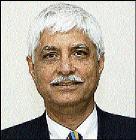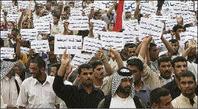Zia Mian, Contributor 
Mian
The credibility of Senator John McCain has been on a constant decline. All indications and polls suggest that come November 4, Democratic candidate Barack Obama will win the race for the presidency of the United States hands down. He is expected to be inaugurated as the first black president on January 20, 2009.
It seems that this election is about economic issues, which is far from reality. Although the questions on many minds are, once in the Oval Office, how the many economic problems that the country faces, the budgetary constraints being on top of the agenda, would be dealt. Obama has a long list of programmes, which, among others, include investing billions of dollars in direct spending, tax credits and loan guarantees and hope to create millions of jobs. It remains to be seen how credible these programmes would be and how they will be financed. However, notwithstanding the importance of economy, the foreign policy and energy policy would pose serious immediate challenges for the new incumbent.
The first definite change that would be needed is the foreign policy stance of Republicans. This is critical from the view that the Iraq war is costing hundred of billions of dollars and is one of many contributors to the budgetary deficit as well as American credibility abroad. Contrary to Republican foreign policy stance of confrontation and pre-emptive strikes, Obama is expected to bring back the Democratic tradition. On August 1, Obama said, "When I am president, we will wage the war that has to be won, with a comprehensive strategy with five elements: getting out of Iraq and on to the right battlefield in Afghanistan and Pakistan; developing the capabilities and partnerships we need to take out the terrorists and the world's most deadly weapons; engaging the world to dry up support for terror and extremism; restoring our values; and securing a more resilient homeland."
In a scholarly article published on September 23, (The New President and the Global Landscape), George Friedman, chief intelligence officer and founder of Stratfor (www.stafor.com) wrote, "It has often been said that presidential elections are all about the economy.
Foreign policy

Protesters display placards and banners during a rally in Kerbala, 110 km (70 miles) south of Baghdad in September 2007. In the wake of the November 4 elections, the foreign policy stance of the Republicans will have to be changed. - File
That just isn't true. Harry Truman's election was all about Korea. John Kennedy's election focused on missiles, Cuba and Berlin. Lyndon Johnson's and Richard Nixon's elections were heavily about Vietnam. Ronald Reagan's first election pivoted on Iran. George W. Bush's second election was about Iraq. We won't argue that presidential elections are all about foreign policy, but they are not all about the economy. The 2008 election will certainly contain a massive component of foreign policy.
"The foreign policy test for the next US president will be calibrating three urgent requirements with a military force that is exhausted by five years of warfare in Iraq and seven in Afghanistan. This force was not significantly expanded since September 11, making this the first global war the United States has ever fought without a substantial military expansion. Nothing the new president does will change this reality for several years, so he will be forced immediately into juggling insufficient forces without the option of precipitous withdrawal from Iraq, unless he is prepared to accept the consequences, particularly of a more powerful Iran.
"Therefore, the next president very quickly will face the question of how to deal with Iran. The Bush administration solution - relying on quiet understandings alongside public hostility - is one model. It is not necessarily a bad one, so long as forces remain in Iraq to control the situation. If the first decision the new US president will have to make is how to transfer forces in Iraq elsewhere, the second decision will be how to achieve a more stable understanding with Iran."
I expect that Obama would take a more pragmatic approach and build alliance to deal with Afghanistan, Iran and Pakistan. The Afghan situation, unless there is massive increase in military deployment (an unlikely scenario) and full support from Pakistan, would remain, at best, precarious. Taliban represent an important cohesive threat and to resolve the Afghan issue effectively would require a direct dialogue with Talibans, an option not acceptable to the Republicans. But given Democrats record, Obama would definitely engage the Talibans, which is more likely to upset current balance of power in Kabul and the Karzai government.
Virtue
In other words, he needs Machiavellian virtue, and I am sure Obama would stand to the task. Although portrayed by Republicans as an axis of evil, Iran is not an immediate threat and there is nothing that can not be resolved through diplomatic dialogue with Iran.
On the energy front, the United States has been at it since President Nixon. All successive administrations promised energy independence. I recall participating in President Carter's energy policy Trilateral Commission Review Task Force in the late 1970s. That document is still gathering dust as are all subsequent plans. To date, America lacks a comprehensive and coherent energy policy and strategy. Just like the financial sector, there is no oversight in the energy sector. The interest groups and lobbyists run the sector and formulate strategies that suit them. The recent energy price volatility is a testimony to the total disregard for fundamentals and disconnect of energy and financial markets. Last year, five top energy companies earned US$130 billion in net profits with return on investment averaging between 20 and 30 per cent.
Obama's Energy Independence plan talks of eliminating oil imports from Venezuela and the Middle East, creating millions of new green jobs, and ending the undue influence of special interests, and politicians who would rather propose gimmicks to get them through an election instead of long-term solutions that will get America closer to energy independence.
Hybrids
He proposes to invest strategically US$150 billion over 10 years to accelerate the commercialisation of hybrids, promote development of commercial-scale renewable energy, encourage energy efficiency, and invest in low emissions coal plants. The energy companies make far more than that in net profits each year.
Unfortunately, cutting foreign oil imports is a wishful thinking that has plagued the former administrations, while opening the way for interest groups to take billions of taxpayers' dollars in subsidies to develop alternatives. The United States of America accounts for about 24 per cent of the world's oil consumption, while it only possesses about 2.4 per cent of the world's reserves. It heavily relies on imports to meet the domestic demand. Most of this consumption is destined to the transport sector. Hence, building of nuclear plants will not reduce reliance on imported oil. The cost of clean-coal technology is high, which would also mean increase in the price of electricity. Volatile energy markets would have to be addressed through a comprehensive and pragmatic strategy rather than green energy and energy-independence slogans.
Zia Mian is a retired senior World Bank official, an international consultant on information technology and energy. He may be reached at mian_zia@hotmail.com. Feedback may also be sent to columns@gleanerjm.com.

